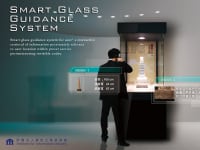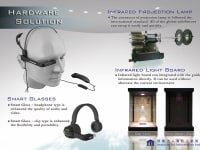What SGG technology does
Smart Glass Guidance (SGG) is an information service system technology for users' interactive retrieval of service information proximate to user location within a preset service perimeter. The service perimeter can be any defined space in- or outdoors that provides a set of service functionality like guiding a tour in a museum or an art gallery, providing merchandize information in a shopping mall, or monitoring and controlling operations in a factory, etc.
In a museum or gallery, the user is a visitor to spectate the artifacts or artworks. In a mall the user is a customer browsing and choosing from among the merchandizes, and, in a factory, the user can be a technician to inspect, adjust, or operate the production equipments.
In a museum, the guest can passively receive or actively request more information regarding the artifact right in front via the smart glass display of SGG. Information displayed in the personal smart glass wore by the visitor can never be obstructed. In a shopping mall, the merchandize of interest can be scrutinized in more detail before making a decision to buy. In a factory, the engineer can access, for example, operating procedural steps of a machine down to every detail through the smart glass display.
How SGG operates
SGG is a service system built around a set of hardware and a system of software for providing to user information relevant to specific functionalities so that the user can perform intended tasks within the service perimeter. It operates a simple yet effective system of infrared (IR) codes each assigned to one item in the service perimeter to uniquely identify that specific item. Due to its infrared nature, the IR code placed aside its assigned subject matter does not interfere with the normal display of the subject. A simple IR light source illuminates the code so that the IR imaging hardware of the SGG smart glass can discern it from others. With SGG’s interactivity and sophistication, a user can perform the desired tasks with efficiency and precision.
When deploying IR markers of unique identification codes within the service perimeter, a Structure-from-Motion (SfM) approach automatically recovers from interferences caused by camera motion and interferences from two or more images. SfM processing pipeline outputs 3D coordinates of key points of detected markers upon successful process execution.
SGG operates in the infrared spectrum and therefore introduces no interference whatsoever to the user’s normal activity. An infrared camera in the smart glass picks up the infrared reference image. With this image invisible to the visitor, the SGG system is able to detect the presence of the user within the functional vicinity. The system can then push service information to the user. Upon user request, SGG smart glass display can further provide more information.
As a smart-glass-based service system for user’s interactive retrieval of proximal information within a preset service perimeter, one first demonstrated application of SGG is in a museum for visitors’ guidance. SGG is certainly also useful in many other applications.
Video
Like this entry?
-
About the Entrant
- Name:Ching Wen Lin
- Type of entry:teamTeam members:Ching-Wen Lin Chun-Ming Wang Wei-Ming Chiang Ming-Fang Weng Shan-Shan Shen Yen-Ling Wei Shih-Tang Chen
- Patent status:pending








